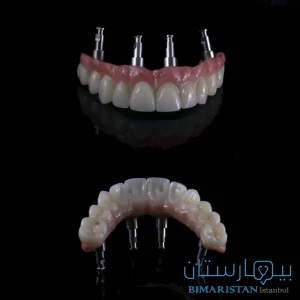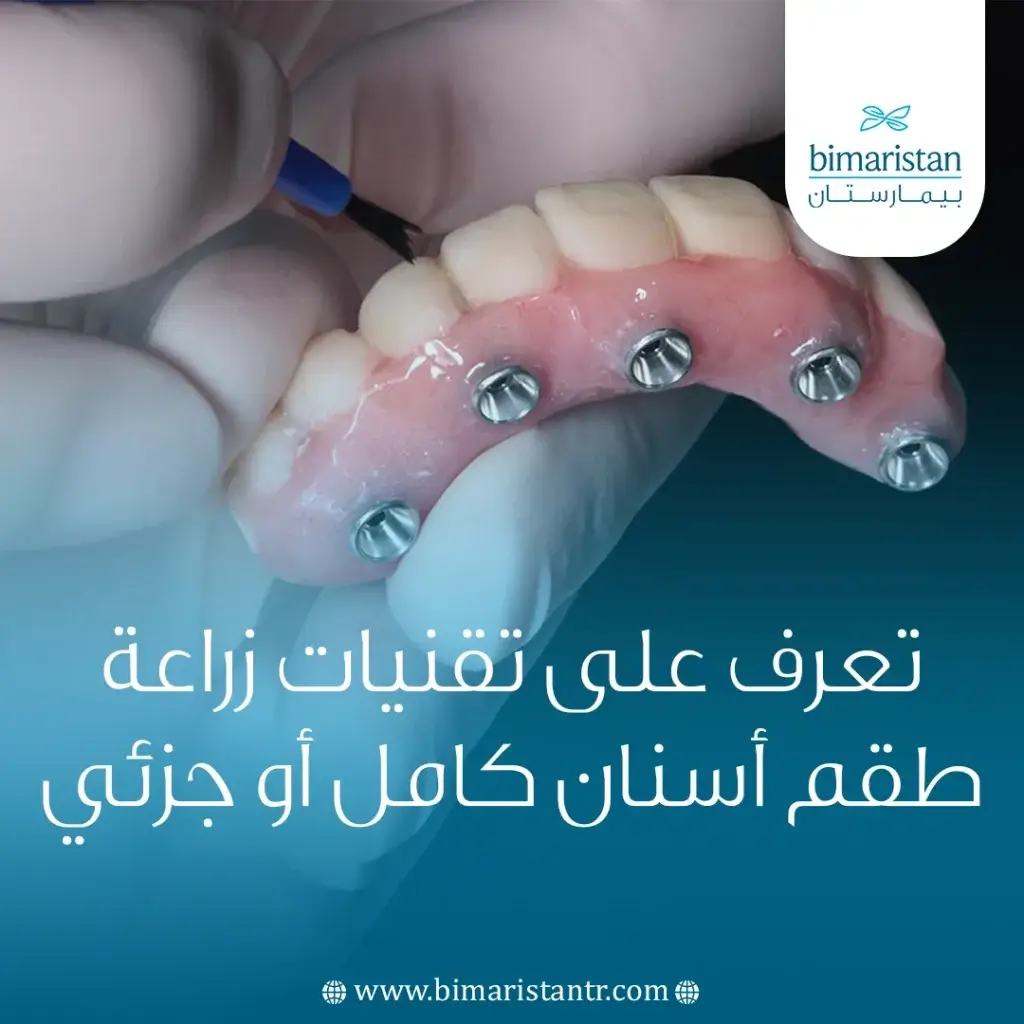تكنولوجيا زراعة طقم أسنان كامل أو جزئي المتاحة في تركيا هي الحل إذا كنت تبحث عن طقم أسنان ثابت ومستقر وملائم يعوض عن فقدان جميع الأسنان أو حتى بعضها،
يجد العديد من الأفراد الذين ليس لديهم أسنان في أحد الفكين أو كليهما أن أطقم الأسنان طريقة اقتصادية لاستعادة ابتساماتهم ولكن ليس من السهل دائماً ارتداؤها، ففي بعض الأحيان تنزلق عندما تحاول الأكل أو التحدث خصوصاً السّفلي الذي يمكن أن ينزاح بسهولة باللسان.
يمكن لطقم أسنانك السائب أن يجعلك تشعر بالخجل ويمنعك عن القدرة على مضغ طعام مغذي ويسبب فقدان عظام الفك بمرور الوقت عن طريق الضغط على النتوءات العظمية التي كانت تدعم الأسنان سابقاً.
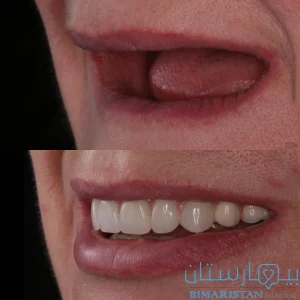
لحسن الحظ هناك طريقة بسيطة لمنع كل هذه المشاكل: دعم أطقم الأسنان بزراعة الأسنان.
أهمية زراعة طقم أسنان كامل
ربما سمعت عن زراعة الأسنان الفردية لتعويض المفقودة منها، وهذا بالتأكيد ذو فائدة كبيرة لأولئك الذين لا يزال لديهم العديد من أسنانهم الطبيعية ولكن في حال عدم وجود أي سن في الفك، فإن التعويض بزرعة لكل سن سيكون ذو كلفة كبيرة.
الحل البديل الممتاز هو وضع ما لا يزيد عن 2 لـ 4 غرسات لدعم الجهاز المتحرك حتى لا ينفك عند ارتدائه وتأمين استقرار وثبات وراحة افضل.
لماذا زراعة طقم أسنان كامل تعد خطوة مهمة لصحتك؟
زرعات الأسنان عبارة عن دعامات صغيرة من التيتانيوم تخدم نفس الغرض مثل جذر الأسنان الطبيعية فهي تثبت الأسنان البديلة في عظم الفك في الفم.
نظراً لأن التّيتانيوم يتمتع بقدرة فريدة على الاندماج مع العظام الحية فإن الزّرعات الخاصة بك تصبح جزءاً من العظم وتساعد في الحفاظ على حجمها وكثافتها وهو اعتبار مهم لصحتك ومظهرك.
عندما يتم تثبيت جهاز الأسنان بالزراعة، فإنه لا يضغط على أنسجة العظام بطريقة مدمرة وسيظل مستقراً وأنت تأكل وتتحدث وتبتسم، هذا الأمر له تأثير إيجابي للغاية على نوعية الحياة.
إذا كنت ترتدي واحداً بالفعل فقد نتمكن من تعديله ليصبح مدعوم بالزرع أو نصنع واحد جديد مخصص.
أنواع أطقم الأسنان الكاملة والجزئية ذات الزرعات
هنالك عدة خيارات متاحة أمامك عند اختيارك لعلاج زراعة طقم أسنان كامل أو جزئي، بمكنك الاختيار فيما بينها بمساعد طبيبك حسب الحالة المادية وتفضيلاتك الشخصية
طقم أسنان كامل قابلة للإزالة مدعوم بالزرعات
أطقم الأسنان المدعومة بالزرع هي نوع من بدلات الأسنان التي تستخدم أربعة أو ستة غرسات مثبتة في عظم الفك، تساعد هذه الغرسات على الحفاظ على مستوى عظام الفكين ومنع تراجعه بعد فقدان الأسنان مما سيساعد هذا في تحسين استقرار الطقم وتقديم مظهر أكثر شباباً.
يتطلب إجراء الزراعة لدعم أطقم الأسنان عمليتين جراحيتين: الأولى لوضع الغرسة في عظم الفك والأخرى للكشف عن الغرسة لصنع طقم أسنان مناسب، يمكن إزالة الطقم المدعوم بالزرع عندما يحين وقت النوم أو عندما يحتاج المريض إلى تنظيفه.
طقم أسنان كامل ثابت مدعوم بالزرعات
طقم الأسنان الثابت المدعوم بالزرع يشبه الفابل للإزالة لكنه يتميز بكونه مثبت فيا مكانه فوق الزرعات بواسطة براغي ولا يمكن للمريض نزعه وسيحتاج إلى طبيب أسنان لفك الطقم عن الزرعات لإزالته.
يوفر هذا الخيار ثبات الطقم عند المريض الأدرد عديم الأسنان، ولكن المشكلة تكمن بعدم إمكانية التنظيف لأن طبيب الأسنان هو الوحيد الذي يمكنه إزالته، كما أنه عادةً ما يكون الخيار الأكثر تكلفة لأنه يحتاج إلى أربع عمليات زرع أسنان ويستخدم براغي كدعامات تستند عليها الأطقم.
طقم أسنان كامل مدعوم بالزرعات مثبت بقضيب معدني (بار)
تتميز الزرعات الداعمة لهذا النوع من الأطقم بووجود قضيب على شريط متصل بالغرسات التي يمكن لطقم الأسنان أن ينطبق عليها، حيث يسمح بنزع وتركيب طقم الأسنان حسب الحاجة كالتنظيف وأثناء النوم ويوفر أماناً أكثر من طقم الأسنان التقليدي.
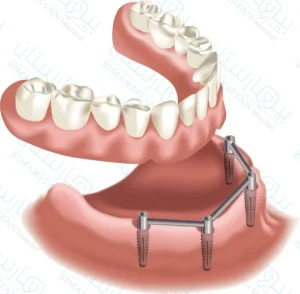
طقم أسنان كامل مدعوم بالزرعات مثبت بدعامة كروية
تعتبر حلاً ممتازاً للفك السفلي حيث يتم عادةً إدخال غرستين أو أربع غرسات في عظم الفك.
ملحقات هذه الزرعة ذات الرأس الكروي تجعل من السهل تنظيفها وتغيير الأجزاء بسهولة إذا كانت هناك حاجة إلى الاستبدال كما يوفر هذا النوع الاستقرار والوظائف المحسنة مقارنة بأطقم الأسنان التقليدية.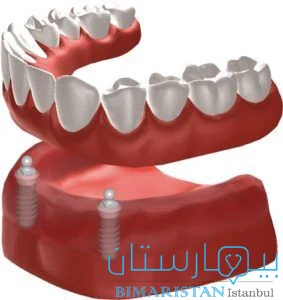
طقم أسنان جزئي مدعوم بالزرعات
أحياناً يفقد الشخص عدداً قليلاً فقط من الأسنان ويحتاج إلى طقم أسنان جزئي، عادة ما يكون قابلاً للإزالة.
يشبه طقم الأسنان الجزئي طقم الأسنان الكامل حيث يتم التعويض عن الأسنان المفقودة بغرسة واحدة أو أكثر حسب الحاجة ومن ثم تثبيت الطقم الجزئي على الغرسات.
يعطي هذه النوع مظهراً أكثر طبيعية مقارنة بأطقم الأسنان الجزئية التقليدية.
خطوات زراعة طقم أسنان كامل أو جزئي
سيقوم طبيب الأسنان أو الجراح بمراجعة جميع خطوات عملية الزرع معك.
1. المشورة الطبية
ناقش مع طبيب أسنانك جميع احتياجاتك واهتماماتك وميزانيتك.
سيقوم الطبيب بإجراء فحص شامل ومراجعة شاملة لتاريخك الطبي وتاريخ الأسنان.
عادةً ما يتم التقاط الصور الفوتوغرافية وأخذ الانطباعات والصور الشعاعية ثلاثية الأبعاد لتحديد ارتفاعات عظامك وما إذا كنت بحاجة إلى أي عمليات جراحية إضافية مثل زرع وتطعيم العظام أو رفع الجيوب الفكية.
2. وضع الزرعات
سيتم تخديرك باستخدام مخدر موضعي ثم يتم تثبيت العديد من غرسات التيتانيوم في عظم الفك وبعدها خياطة اللثة لمساعدتك على الشفاء.
3. عملية الشفاء
تحتاج إلى التعافي خلال ثلاثة إلى ستة أشهر حيث يستغرق الاندماج العظمي وقتاً.
4. برغي الشفاء
بمجرد أن تتعافى سيقوم طبيب أسنانك بكشف الغرسات من اللثة ويضع غطاء يدعى ببرغي الشفاء للمساعدة في معرفة مكان الدعامة والتعويض.
5. أخذ الانطباعات
يتم أخذ انطباع بواسطة المسح الرقمي أو الانطباعات التقليدية وإرساله إلى المختبر لصنع التعويض من خلال عمل هيكل الطقم والأسنان الصناعية.
يمكن أن تستغرق هذه العملية عدة مواعيد.
6. تجربة الطقم
بمجرد الانتهاء من زراعة طقم أسنان كامل أو حزئي سيحاول طبيب أسنانك بإجراء أي تعديلات ضرورية.
إذا كان مناسباً يتم تثبيت الطقم بشكل دائم في مكانه ومن ثم إعطاؤك تعليمات ما بعد الرعاية حول كيفية العناية بالطقم الجديد.
ما هي مميزات التعويض باستخدام زراعة طقم أسنان كامل او جزئي؟
يساعد تركيب البدلات المزروعة على السماح بالتعويض عن بعض أو كل الأسنان المفقودة في قوس الأسنان وفي منع خسارة العظم الذي يحدث عند قلع الأسنان.
فمع عدم وجود الأسنان لا توجد هناك فائدة لعظم الفك مما يؤدي إلى تراجعه وذوبانه هذا الانكماش في عظم الفك له عواقب جمالية على وجهك فيجعل مظهرك يبدو أكبر عمراً خاصة عند فقد كل الأسنان.
عند الحصول على عملية زرع طقم أسنان كامل أو جزئي يتم استخدام العظام والحفاظ عليها ودعم الوجه حيث يحل تركيب كل من طَقم الأسنان المدعوم بالزرعات وطَقم الأسنان التقليدي القابل للإزالة محل أنسجة الأسنان واللثة و يعمل على استبدالها.
ولكن ما يميز المدعوم بالزرعات كونه يعمل مثل الأسنان الطبيعية أكثر من الأطقم المتحركة التقليديّة، يستقر طَقم الأسنان المدعوم بالزرع في مكانه بأمان حتى أثناء المضغ والتحدث.
بالإضافة إلى ذلك توفر هذه الأطقم وباقي الخيارات التعويضية الأخرى عن الأسنان الحماية لكل من الإطباق ومفصلي الفك، بالمقارنة مع الأطقم التقليديّة من المرجح أن تعمل هذه التقنية الآمنة والوظيفية على تحسين ثقتك بنفسك واحترامك لذاتك وجودة حياتك.
كم عدد الغرسات التي تحتاجها من أجل زراعة طقم أسنان كامل؟
يعتمد عدد الغرسات التي يمكنك الحصول عليها من أجل زراعة طقم أسنان كامل أو جزئي بشكل أساسي على القوس أو عظم الفك الذي تتم معالجته.
هناك اختلاف جوهري في كثافة العظام (صلابة الأساس العظمي للزرع) بين عظمي الفك العلوي والسفلي.
فالفك السفلي بطبيعته يحتوي على عظم أكثف من الفك العلوي لذلك هناك حاجة إلى عدد أقل تبين الدراسات أنه عادة من 2 إلى 4 زرعات للفك السفلي تسمح بدعم كاف لبدلة كاملة، بينما هناك حاجة إلى المزيد، عادة 4 أو أكثَر لتأمين الدعم لبدلة كاملة بدون تغطية سقف الحنك.
ولكن هذا ليس العامل الوحيد الذي يجب على الطبيب أخذه بعين الاعتبار عند التخطيط لـِ زراعة طقم أسنان كامل أو جزئي بل هناك عاملان رئيسيان آخران هما:
عادات الفم
كأن يعاني المريض صرير الأسنان (طحن الأسنان) وهو من العادات الأكثر شيوعاً، أو اضطراب الفك الصدغي TMD، يؤدي هذا إلى التفكير في زرع المزيد من الغرسات.
الفك المقابل
فك بأسنان طبيعية لديه قوة عض أكبر، لذلك إذا كان القوس المقابل أسناناً طبيعية فعادةً ما يلزم المزيد من الغرسات والعكس صحيح.
على سبيل المثال عندما يكون لدى المريض طقم اسنان علوي تقليدي ويرغب بالحصول على زراعة طقم أسنان كامل فإن معظم الحالات تتطلب فقط غرستين في الفك السفلي.
ما هو معدل نجاح زراعة طقم أسنان كامل؟
بالنسبة للأشخاص السليمين الذين يتمتعون بصحة فموية جيدة فقد سجل التعويض بتكنولوجيا زراعة الأسنان معدلات نجاح تتجاوز نسبة 90-95 بالمئة، تعتبر النظافة الجيدة للفم مهمة جداً لنجاح الطقم الكامل والجزئي المثبّت بالزرع.
في حال رغبتك بخوض هذه التجربة العلاجية بإشراف أمهر الأطباء وأحدث الأجهزة في اسطنبول فإن مركز بيمارستان الطبي هو خيارك الأول للعلاج في تركيا.
نرشدك لأفضل الأخصّائيين الخبراء بكافة الأقسام ونسهّل لغة التواصل بينك وبين الجميع عن طريق أطباء عرب متخصصين سيساعدونك في التواصل مع طبيبك.
لا تتردد بالتواصل معنا، مركز بيمارستان عائلتك في تركيا.
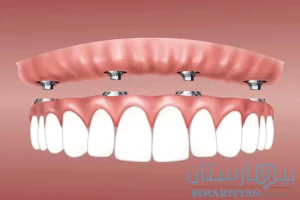
يتراوح العمر الطبيعي لأطقم الأسنان من 5 إلى 10 سنوات لكن هذا يمكن أن يختلف حسب الشخص، بمرور الوقت قد تحتاج هذه الأجهزة إلى إعادة تبطينها أو إعادة صنعها.
تبطين وإعادة صنع الأجهزة
تبطين أطقم الأسنان هو عندما يتم إضافة مادة جديدة إلى باطن الطقم ليتناسب مع لثتك، يتم إعادة صنعها عندما يتم عمل قاعدة جديدة مع الاستمرار باستخدام الأسنان الموجودة.
سيتم عادة إصلاح أو استبدال طقم الأسنان الاصطناعية بعد سنوات عديدة من الخدمة، مثل الأسنان الطبيعية وأطقم الأسنان التقليدية يمكن أن تتلف وتنكسر بدلة الزرع.
بالمتوسط كل 6 إلى 24 شهراً يبلى النايلون المحدد أو جزء الحلقة المطاطية من جهاز تثبيت الغرسة المستخدم لتثبيت أطقم الأسنان، عندما يحدث هذا فإن أطقم الأسنان لا تثبت بإحكام كما اعتادت (تقل قوة الكتمان).
عادة ما يكفي استبدال النايلون أو مجموعة الحلقات لتتلائم بشكل جيد ومريح مرة أخرى، ومع ذلك عادةً بعد عدة سنوات من الخدمة (متوسط 5 إلى 15 عاماً) قد تحتاج الدعامات إلى الاستبدال بسبب التآكل.
كيف أنظف أطقم الأسنان ذات الزرعات؟
- من المهم أن تضع في اعتبارك أن أي طقم قابل للإزالة لا يُنصح بارتدائه على مدار 24 ساعة في اليوم بل يوصى بنزعه في الليل إذ يمكن أن تتهيج الأنسجة المغطاة بمواد طقم الأسنان طوال الوقت أو حتى تلتهب وتصاب بالفطور.
- يجب أن تعتني جيداً بطقم الأسنان مثل الأسنان الطبيعية، تأكد من تنظيفه يومياً لتجنب تراكم جزيئات الطعام أو البلاك.
- عند تنظيفه بالفرشاة تجنب استخدام معجون الأسنان لأن معظم معاجين الأسنان تحتوي على جزيئات كاشطة، يعد صابون اليدين السائل بديل جيد.
- احتفظ به في الماء أو محلول نقع أطقم الأسنان أثناء نزعه حتى لا يجف.
- اشطفه جيداً بعد استخدام أي منظف للأسنان لأنها قد تحتوي على مواد كيميائية لا ينبغي أن تدخل الفم.
- تتطلب الغرس صيانة منتظمة في المنزل والنظافة الاحترافية تماماً كما في الأسنان الطبيعية، يعتبر تنظيف الغرسات والدعامات مرتين يومياً أمراً مهماً للغاية.
- يوصى بزيارة العيادات السنية بشكل دوري كل 3 إلى 6 أشهر لفحص زرعات الأسنان والأطقم.
- تُعد زراعة طقم أسنان كامل أو جزئي طريقة رائعة لتأمين المزيد من التوافق والثبات الأفضل والكلام الأفضل.
- تحدث إلى طبيب الأسنان واكتشف ما إذا كان علاج زراعة طقم أسنان كامل خياراً مناسباً لك.
المصادر
- NewMouth
- Smilow
- Family Dental
- Infinity Dental Clinic
